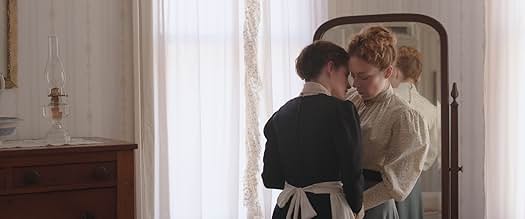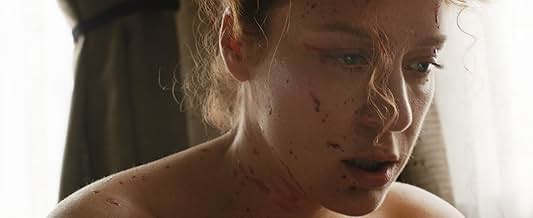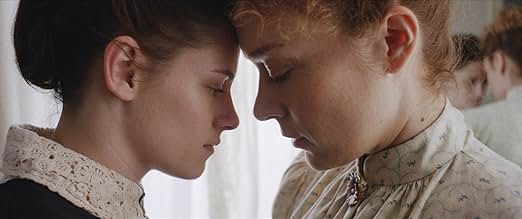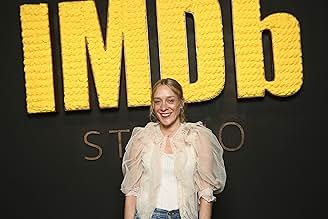IMDb RATING
5.9/10
9.7K
YOUR RATING
A psychological thriller based on the infamous 1892 murders of Lizzie Andrew Borden's family.A psychological thriller based on the infamous 1892 murders of Lizzie Andrew Borden's family.A psychological thriller based on the infamous 1892 murders of Lizzie Andrew Borden's family.
- Awards
- 1 nomination
- Director
- Writer
- All cast & crew
- Production, box office & more at IMDbPro
Storyline
Did you know
- TriviaThe photograph in the locket that the fictional Lizzie's father gives her is of the real Lizzie Borden's mother Sarah. She died when Lizzie was a baby.
- GoofsThe end of the film states that Emma and Lizzie had a rift "soon after" the trial and became estranged, but it was actually 12 years later that Emma separated from Lizzie and moved out of their house forever. No one knows for sure what the rift was about, but it's believed by many that Emma discovered Lizzie really was guilty of the murders.
- Quotes
Bridget Sullivan: What was I to you? I don't know who you are.
Lizzie Borden: Were you better off before? Is that it?
- SoundtracksEbben? Ne Andrò Lontana From 'La Wally', Act I
Written by Alfredo Catalani
Performed by Maria Luigia Borsi and the London Symphony Orchestra, conducted by Yves Abel
Courtesy of Naxos
By arrangement with Source/Q
Featured review
Just four years after Lizzie Borden Took an Ax and the campy TV mini series it spawned, were audiences really clamoring for another Lizzie Borden film?
An uninspiring cast sleepwalks its way through this speculative take on an all-too-familiar story in Lizzie (2018), written by Bryce Kass and directed by Craig William Macneill. The film pits Lizzie Borden and the family's live-in maid, Bridget Sullivan, against her tyrannical father and unsympathetic step mother in what co-producer and lead actress Chloë Sevigny described as an overtly feminist take.
The film opens in the aftermath of Andrew (Jamey Sheridan) and Abby (Fiona Shaw) Borden's murder. An investigator asks their 32-year-old daughter, Lizzie (Chloë Sevigny), whether her father had any enemies. From there, the film rewinds to the family's employment of a 25-year-old Irish maid named Bridget Sullivan (Kristen Stewart). According to the filmmakers, that was the catalyst for the eventual double homicide, and the answer to the investigator's question. There is never a question about Lizzie Borden's involvement in her parent's death. The obvious foil, and rival for Lizzie's inheritance, her uncle John Morse (Denis O'Hare), serves as a flimsy red herring.
Lizzie's central conflict is between Lizzie, Bridget, and her domineering father, who seeks to control all the women living under his roof. While Lizzie's sister, Emma (Kim Dickens), fades into the background, Lizzie and Bridget find themselves in a compromising position, one that leads to her parents' gruesome murder. Sevigny herself characterized this as a literal "smash the patriarchy" moment.
In real life, Andrew and Sarah Borden were found murdered in their Fall River, Massachusetts home on August 4, 1892. Their middle aged daughters, Lizzie and Emma, lived with them, along with their maid, Bridget Sullivan. There had been significant tension in the family leading up to the murders, and Lizzie gave conflicting alibis. Lizzie was arrested and put on trial. After 90 minutes of deliberation, the all-male jury acquitted her. Her trial was a national media sensation, but to this day, there are many competing theories about "whodunnit."
Like most dramatizations of these events, Lizzie both assumes Lizzie Borden was guilty and that she committed the murders with an ax. In reality, the murder weapon was never determined, though the movie does try to explain why the hatchet in question lacked any evidence of being used in the crime. The film also omitted the food poisoning the family suffered, and the extended trip Lizzie and her sister took prior to the murders. Although the house interior looked accurate, the exterior bears little resemblance to its historic counterpart.
There's also no evidence Lizzie was a lesbian or that she was sexually involved with Bridget Sullivan, or that Mr. Borden sexually assaulted Bridget. That allegation came from mystery author Evan Hunter (aka Ed McBain)'s 1984 novel Lizzie, a work of fiction. Contemporary rumors about Lizzie's sexuality were of the kind gossipers leveled at any unmarried, middle-aged person at the time.
Like Lizzie, Lifetime's biopic Lizzie Borden Took an Ax (2014) also weirdly sexualizes her. Both films depict her as a seductress and show her committing the murders in the nude and drinking alcohol. Lizzie Borden was, in real life, an upper class spinster, Sunday school teacher, teetotaler, and member of the Women's Christian Temperance Union.
Their contemporary revision of Lizzie Borden's personality is where the two films part ways. For all its faults, Lizzie Borden Took an Ax at least accurately portrayed Lizzie and her sister Emma's close relationship, while in Lizzie, Emma vanishes for most of the film. Their actual family dynamic was sidelined to make room for a lesbian fantasy, which at this point is such a boring cliche in feminist film.
Lizzie grossed $642,157 at the box office, and currently holds a 65% rating from critics and 56% audience favorability on RottenTomatoes. The filmmakers were obviously hoping controversy and its two leading ladies would carry their film, but even a contractually-obligated effort on the part of Chloë Sevigny and Kristen Stewart couldn't save this dreary rehash of a 126-year-old unsolved murder.
An uninspiring cast sleepwalks its way through this speculative take on an all-too-familiar story in Lizzie (2018), written by Bryce Kass and directed by Craig William Macneill. The film pits Lizzie Borden and the family's live-in maid, Bridget Sullivan, against her tyrannical father and unsympathetic step mother in what co-producer and lead actress Chloë Sevigny described as an overtly feminist take.
The film opens in the aftermath of Andrew (Jamey Sheridan) and Abby (Fiona Shaw) Borden's murder. An investigator asks their 32-year-old daughter, Lizzie (Chloë Sevigny), whether her father had any enemies. From there, the film rewinds to the family's employment of a 25-year-old Irish maid named Bridget Sullivan (Kristen Stewart). According to the filmmakers, that was the catalyst for the eventual double homicide, and the answer to the investigator's question. There is never a question about Lizzie Borden's involvement in her parent's death. The obvious foil, and rival for Lizzie's inheritance, her uncle John Morse (Denis O'Hare), serves as a flimsy red herring.
Lizzie's central conflict is between Lizzie, Bridget, and her domineering father, who seeks to control all the women living under his roof. While Lizzie's sister, Emma (Kim Dickens), fades into the background, Lizzie and Bridget find themselves in a compromising position, one that leads to her parents' gruesome murder. Sevigny herself characterized this as a literal "smash the patriarchy" moment.
In real life, Andrew and Sarah Borden were found murdered in their Fall River, Massachusetts home on August 4, 1892. Their middle aged daughters, Lizzie and Emma, lived with them, along with their maid, Bridget Sullivan. There had been significant tension in the family leading up to the murders, and Lizzie gave conflicting alibis. Lizzie was arrested and put on trial. After 90 minutes of deliberation, the all-male jury acquitted her. Her trial was a national media sensation, but to this day, there are many competing theories about "whodunnit."
Like most dramatizations of these events, Lizzie both assumes Lizzie Borden was guilty and that she committed the murders with an ax. In reality, the murder weapon was never determined, though the movie does try to explain why the hatchet in question lacked any evidence of being used in the crime. The film also omitted the food poisoning the family suffered, and the extended trip Lizzie and her sister took prior to the murders. Although the house interior looked accurate, the exterior bears little resemblance to its historic counterpart.
There's also no evidence Lizzie was a lesbian or that she was sexually involved with Bridget Sullivan, or that Mr. Borden sexually assaulted Bridget. That allegation came from mystery author Evan Hunter (aka Ed McBain)'s 1984 novel Lizzie, a work of fiction. Contemporary rumors about Lizzie's sexuality were of the kind gossipers leveled at any unmarried, middle-aged person at the time.
Like Lizzie, Lifetime's biopic Lizzie Borden Took an Ax (2014) also weirdly sexualizes her. Both films depict her as a seductress and show her committing the murders in the nude and drinking alcohol. Lizzie Borden was, in real life, an upper class spinster, Sunday school teacher, teetotaler, and member of the Women's Christian Temperance Union.
Their contemporary revision of Lizzie Borden's personality is where the two films part ways. For all its faults, Lizzie Borden Took an Ax at least accurately portrayed Lizzie and her sister Emma's close relationship, while in Lizzie, Emma vanishes for most of the film. Their actual family dynamic was sidelined to make room for a lesbian fantasy, which at this point is such a boring cliche in feminist film.
Lizzie grossed $642,157 at the box office, and currently holds a 65% rating from critics and 56% audience favorability on RottenTomatoes. The filmmakers were obviously hoping controversy and its two leading ladies would carry their film, but even a contractually-obligated effort on the part of Chloë Sevigny and Kristen Stewart couldn't save this dreary rehash of a 126-year-old unsolved murder.
- How long is Lizzie?Powered by Alexa
Details
- Release date
- Countries of origin
- Official sites
- Language
- Also known as
- Ліззі
- Filming locations
- Production companies
- See more company credits at IMDbPro
Box office
- Gross US & Canada
- $642,157
- Opening weekend US & Canada
- $47,580
- Sep 16, 2018
- Gross worldwide
- $844,786
- Runtime1 hour 45 minutes
- Color
- Aspect ratio
- 2.39 : 1
Contribute to this page
Suggest an edit or add missing content







































